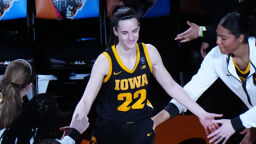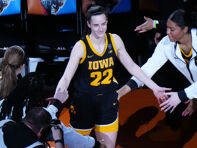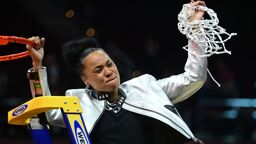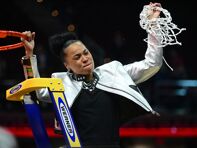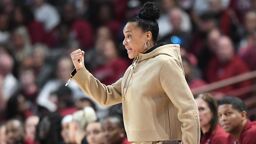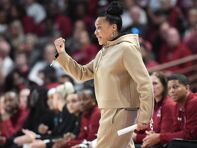The other day Jim Buzinski offered up an idea to speed up the end of college basketball games: limiting the number of timeouts a team can take at the end of the game. However, if Dick Vitale had his way, Jim's suggestion would likely do no good.
Vitale was on ESPNews last night discussing the Davidson upset win over Georgetown. Bemoaning the fact that Georgetown's Roy Hibbert fouled out of the game, Vitale proposed a rule change: not only would a player be allowed six fouls instead of five, but once the sixth foul occurred a coach would have the option of keeping that player in the game. If the player stayed in the game, each foul he committed from then on would result in two free throws plus possession of the ball staying with the other team. Vitale's rationale was that "people pay to see" the star players.
Sure they do — in the NBA. I'd wager that people who regularly attend college games do so because they have a connection to a particular school, or because they prefer the style of game played in college as compared to the NBA. I'm no basketball expert but I'd say the NBA game is more geared to star players while college basketball is a little more team-oriented.
Besides, Hibbert didn't commit his third foul until early in the second half Sunday, with the Hoyas ahead by 14. About 30 seconds after that foul Georgetown extended the lead to 17. There was plenty of time for a Davidson comeback, but there was also plenty of time for Gerogetown to just tread water for however long Hibbert was out of the game. The rest of the Hoyas should have stepped up.
Imagine how long games would take if foul-prone stars were allowed to stay in the game indefinitely, especially with an opponent that was subpar at shooting free throws. It would be a continuous parade to the line. Here's a better idea: "star" players ought to play like stars without fouling. If they're that great it shouldn't be so difficult. — Joe Guckin
The other day Jim Buzinski offered up an idea to speed up the end of college basketball games: limiting the number of timeouts a team can take at the end of the game. However, if Dick Vitale had his way, Jim's suggestion would likely do no good.
Vitale was on ESPNews last night discussing the Davidson upset win over Georgetown. Bemoaning the fact that Georgetown's Roy Hibbert fouled out of the game, Vitale proposed a rule change: not only would a player be allowed six fouls instead of five, but once the sixth foul occurred a coach would have the option of keeping that player in the game. If the player stayed in the game, each foul he committed from then on would result in two free throws plus possession of the ball staying with the other team. Vitale's rationale was that "people pay to see" the star players.
Sure they do — in the NBA. I'd wager that people who regularly attend college games do so because they have a connection to a particular school, or because they prefer the style of game played in college as compared to the NBA. I'm no basketball expert but I'd say the NBA game is more geared to star players while college basketball is a little more team-oriented.
Besides, Hibbert didn't commit his third foul until early in the second half Sunday, with the Hoyas ahead by 14. About 30 seconds after that foul Georgetown extended the lead to 17. There was plenty of time for a Davidson comeback, but there was also plenty of time for Gerogetown to just tread water for however long Hibbert was out of the game. The rest of the Hoyas should have stepped up.
Imagine how long games would take if foul-prone stars were allowed to stay in the game indefinitely, especially with an opponent that was subpar at shooting free throws. It would be a continuous parade to the line. Here's a better idea: "star" players ought to play like stars without fouling. If they're that great it shouldn't be so difficult. — Joe Guckin









